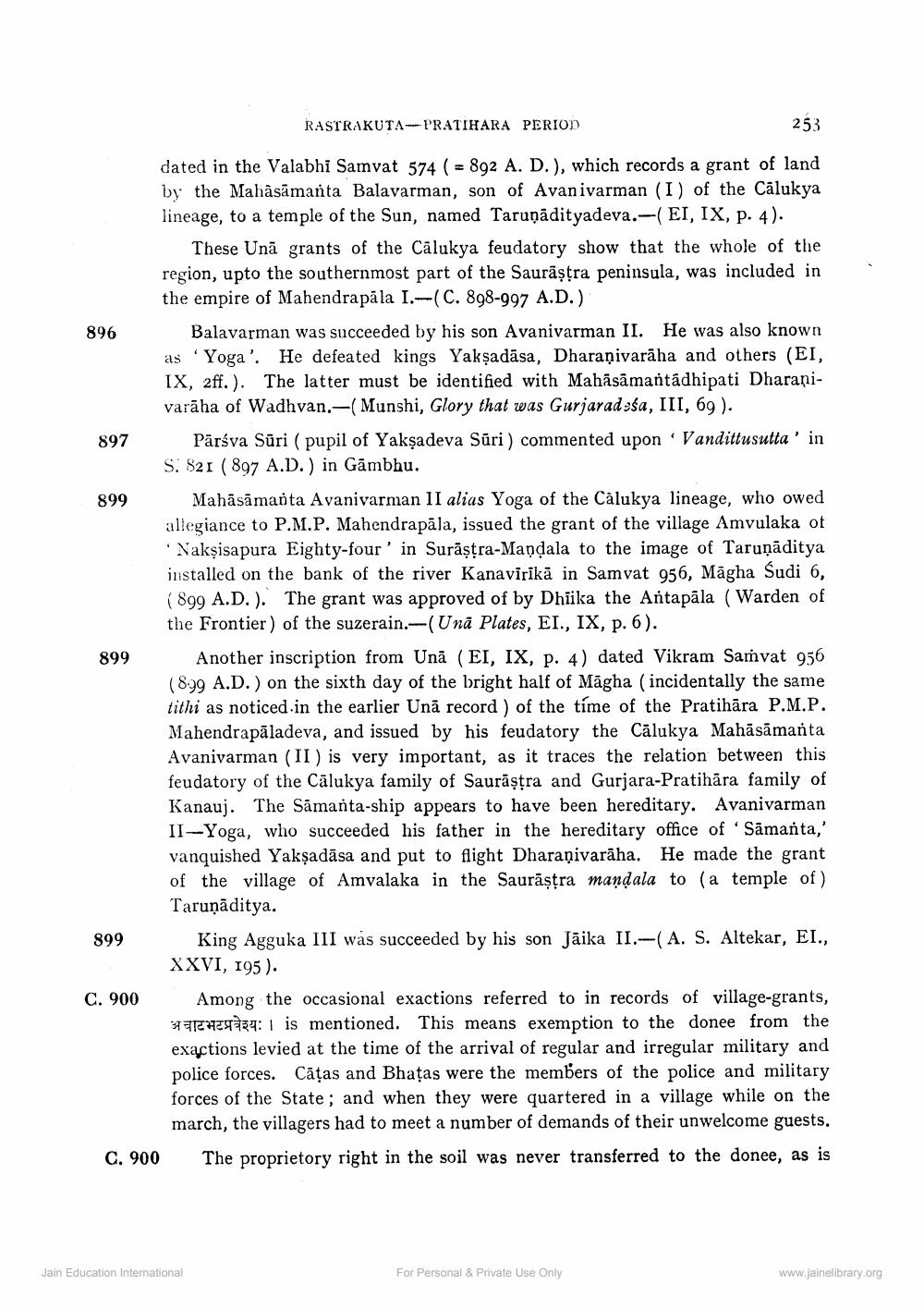________________
896
897
899
899
899
C. 900
RASTRAKUTA-PRATIHARA PERIOD
253
dated in the Valabh! Samvat 574 (= 892 A. D.), which records a grant of land by the Mahasamanta Balavarman, son of Avanivarman (I) of the Calukya lineage, to a temple of the Sun, named Taruṇādityadeva.-( EI, IX, p. 4).
C. 900
These Una grants of the Câlukya feudatory show that the whole of the region, upto the southernmost part of the Sauraşṭra peninsula, was included in the empire of Mahendrapála I.-(C. 898-997 A.D.)
Balavarman was succeeded by his son Avanivarman II. He was also known as Yoga'. He defeated kings Yakṣadāsa, Dharapivaraha and others (EI, IX, 2ff.). The latter must be identified with Mahāsāmantādhipati Dharanivaraha of Wadhvan.-( Munshi, Glory that was Gurjaradska, III, 69).
Parsva Süri (pupil of Yakşadeva Súri) commented upon Vandiflusutta' in S. 821 (897 A.D.) in Gambhu.
Mahāsāmanta Avanivarman II alias Yoga of the Calukya lineage, who owed allegiance to P.M.P. Mahendrapāla, issued the grant of the village Amvulaka ot Nakşisapura Eighty-four in Surâstra-Mandala to the image of Tarunaditya installed on the bank of the river Kanavirikā in Samvat 956, Magha Sudi 6, (899 A.D.). The grant was approved of by Dhiika the Antapala (Warden of the Frontier) of the suzerain.-(Una Plates, EI., IX, p. 6).
Another inscription from Ună (EI, IX, p. 4) dated Vikram Samvat 956 (899 A.D.) on the sixth day of the bright half of Magha (incidentally the same tithi as noticed in the earlier Una record) of the time of the Pratihāra P.M.P. Mahendrapaladeva, and issued by his feudatory the Calukya Mahāsāmanta Avanivarman (II) is very important, as it traces the relation between this feudatory of the Calukya family of Saurästra and Gurjara-Pratihāra family of Kanauj. The Samanta-ship appears to have been hereditary. Avanivarman II-Yoga, who succeeded his father in the hereditary office of Samanta," vanquished Yakṣadāsa and put to flight Dharapivaraha. He made the grant of the village of Amvalaka in the Saurăstra mandala to (a temple of) Tarunāditya.
King Agguka III was succeeded by his son Jäika II.-(A. S. Altekar, EI., XXVI, 195).
Among the occasional exactions referred to in records of village-grants, is mentioned. This means exemption to the donee from the exactions levied at the time of the arrival of regular and irregular military and police forces. Câțas and Bhatas were the members of the police and military forces of the State; and when they were quartered in a village while on the march, the villagers had to meet a number of demands of their unwelcome guests. The proprietory right in the soil was never transferred to the donce, as is
Jain Education International
For Personal & Private Use Only
www.jainelibrary.org




